Permalinks
The library and its end users can share links to the library's materials available in Folio. You can distribute URLs via email, on intranet pages or in word documents, to allow a user to go "straight to" a record in Folio.
![]() In Folio this is available wherever the Permalink icon is displayed.
In Folio this is available wherever the Permalink icon is displayed.
Using permalinks staff and users can distribute Folio links to all the places in Folio listed here.
Example Folio link in an email message:
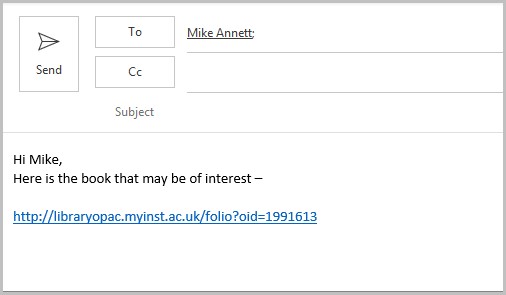
The link takes the recipient straight to Folio where the relevant Title record is displayed.
Straight to title
- The user searches for a Title record in Folio.
- Display the Title details page.
- Click the permalink icon:
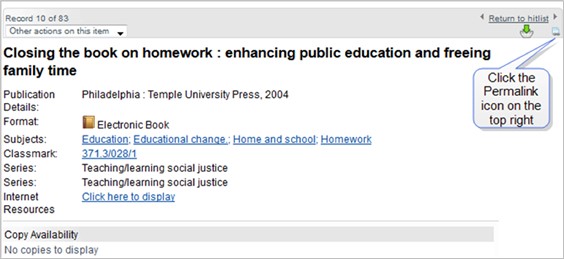
- On clicking the permalink icon, Folio displays the URL so that you can copy it [CRTL c]:

The URL can be distributed by pasting as required into documents or email and such.
Note: it is also possible to include a display format in the URL
E.g:
http:// mylibraryolib.oclc.org/folio/?oid=3007&tiarray=full
This would display the title details in an alternative display format.
Straight to a list
A list is a Folio hitlist showing the contents of a Folder. You can send the URL of a list from the Lists option in Folio:
- In the main menu the user selects the Lists option:

- Click on the relevant list to display the contents of the list and then click the permalink icon:
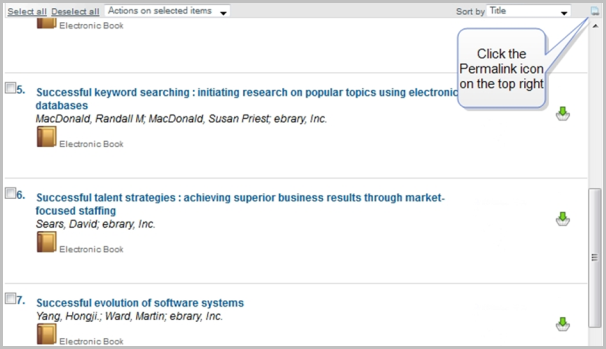
Folio displays the URL for the list so that you can copy [CTRL c] it and distribute by pasting as required into documents or email and such:
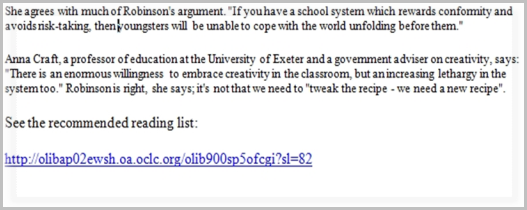
Straight to a title via ISxN
This allows you to build and distribute URLs that contain the ISxN of a bibliographic record in Folio.
The syntax is to enter the following to your base URL:
?isbn=xxxxxxxxxx
For example:
http://mylibrary/folio/?isbn=011621659X
When you paste the link into WORD, email and so on, the user is taken straight to the item in Folio:
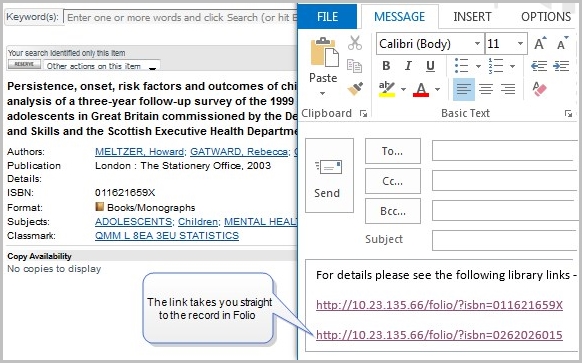
The URL ISxN extension can be one of three options:
?isbn=xxxxxxxxxx
?issn=xxxxxxxxxx
?isxn=xxxxxxxxxx
You can include or exclude hyphens. The URL-
http://mylibrary/folio/?isbn=0-345-66543-0
will take you straight to the title record with an ISBN of 0-345-66543-0. If there is more than one title with the ISxN, the titles are displayed in a standard title hitlist.
Straight to keyword search
You can build and distribute URLs that run a keyword search in Folio and display the results. The syntax is to enter the following to your base URL:
| Syntax | Result |
|---|---|
| ?keywords=term | For one keyword term |
| ?keywords=term1+term2+term3 | For several keywords |
| keyword | (singular) will also work |
For example:
http://mylibrary/folio/?keywords=economics+credit
Here is an example with the URL pasted into email which accesses a demo system URL and runs a keyword search for the terms economics and credit:
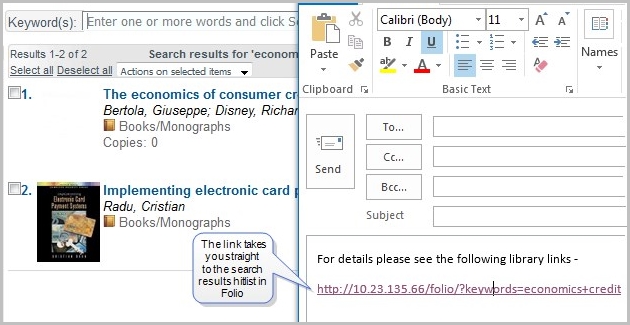
This is the default Folio ‘tumble-down’ keyword search and first lists any titles which match the phrase – and then any records which have both words present.
You can include any of the search features from the standard keyword search – including Boolean operators:
http://mylibrary/folio/?keywords=(economics+credit)+not+consumer
In this case the search will first process the keywords economics credit and then exclude any records which have the word consumer present. There will be no phrase matches.
Straight to a single Object / file attachment
You can build a URL that links straight to objects / file attachments in OLIB. There are 2 ways to achieve this.
Link to specific object
In your email / intranet page / word document, add the key from the Object record in OLIB to the base URL as follows:
?sobj=xxx
For example:
http://myopac.library.org/folio?sobj=123
When the recipient of the document clicks on the link, this navigates directly to the object with a key ID of 123. If display is allowed for that object, the object will be shown.
Tip: this is useful for inclusion in your privacy notice in order to provide a link for the PDF privacy document.
Link to first object of a title
You can build a URL that links to the first object / file attachment of a particular Title number.
In your email / intranet page / word document, add the Title number and URL suffix to the end of the base URL as follows:
?stobj=xxxxx
For example:
http://myopac.library.org/folio?stobj=3457
When the reader of the document clicks on the link, this navigates to the first displayable object that is linked to Title number 3457.
Straight to user
The library can create a link going “straight to” a User record.
In your email / intranet page / word document, add the user barcode to the end of the Folio URL as follows:
?barcode=xxxx
For example:
http://myolibsystem.oa.oclc.org/app9...barcode=100382
When the reader of the document clicks on the link, they are taken directly to the User’s record in Folio:
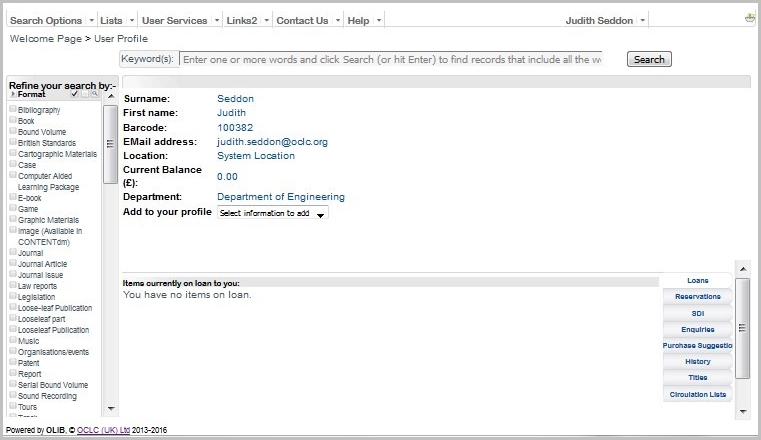
If the User has a password on their account, or if Folio is configured to require a password, then the login menu will be presented and the login will not complete unless the correct password is entered.
Normal rules will be applied for temporary passwords, User Account Expiry dates and Ban settings.
(For backward compatibility, ?xbarcode= and ?ybarcode= are synonymous with ?barcode=.)
Straight to a renewal process
You can build a URL in Folio that navigates to a renewal process, following user authentication.
In your email / intranet page / word document, add the user barcode and copy barcode to the end of the base URL as follows:
?xbarcode=xxxxxx&sren=xxxxxx
For example:
http://myopac.library.org/folio?xbar...B&sren=000123X
When the reader of the document clicks on the link, this navigates to Folio for the user to log in and the renewal to take place.
Straight to a reservation process
You can build a URL that navigates directly to the reservation screen in Folio for a specified Title number. The user is prompted to authenticate in order to complete the process.
In your email / intranet page / word document, add the Title number for reservation to the end of the base URL as follows:
?sres=xxxxxx
For example:
http://myopac.library.org/folio?sres=3457
When the reader of the document clicks on the link, this navigates to the reservation screen in Folio, for the specified Title. The user logs in to process the reservation.
Permalink display options
This relates to the Permalinks display that is available for the "straight to" Title records, and the "straight to" Folder hitlist:

Settings for the permalink can be configured in:
- g_permalink
You can configure:
| Setting | Description |
|---|---|
| permalink_label | Hover text for permalink icon |
| permalink_note_oid | Text of the URL field label |
| permalink_close | Hover text for close window icon |
Changes take effect as soon as the Folio page is refreshed.
- Go to OPAC> OPAC Config Block
- Search for g_permalink.
- Open the Folio Permalink configuration record to display details.
- In Config Settings click the Interface column link (e.g.1) for one of the above settings you wish to change.
- In the setting record, switch to modify and edit the Value field to your preferred text.
- Save and close.